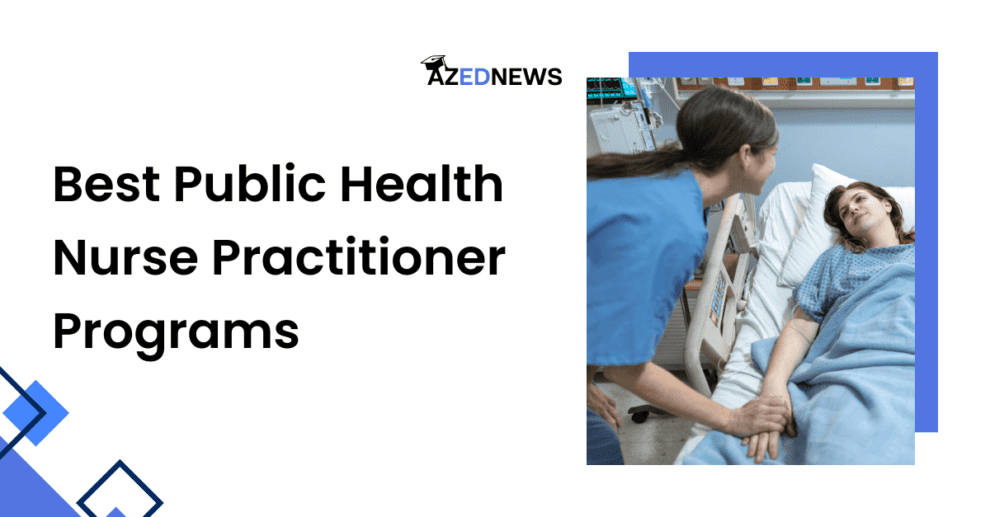Looking for the best public health nurse practitioner programs? You have landed on the right article. If you want to become an advanced practice nurse, public health nurse practitioner programs can help you achieve your goals. Top universities offer the public health nurse practitioner programs that are a great pathway for registered nurses to advance their careers.
Table of Contents
Nursing students can learn about public health principles, and interventions to enhance public health and well-being and address health disparities among vulnerable and diverse communities through public health nurse practitioner programs. These specialized programs empower nursing professionals to tackle public health issues through preventive care and health promotion.
By seamlessly blending clinical proficiency with a dedicated focus on population health, these programs enable nurses to effectively navigate diverse healthcare environments.
Discover the best public health nurse practitioner programs offered by various renowned universities that play a significant role in advancing public health initiatives.
What is a Public Health Nurse Practitioner?
A public health nurse practitioner is a highly skilled healthcare professional who combines nursing and public health expertise. They lead population-level health improvement efforts with an emphasis on community well-being. These professionals work to improve health, prevent disease, and educate communities through the implementation of assessments, planning of interventions, and collaboration with various partners.
Their work goes beyond providing standard clinical care. Through well-conceived and comprehensive public health programs, public health nurse practitioners have a major impact on the general health and well-being of communities. Registered nurses who choose to pursue a master’s degree in public health should think of it as a rapidly expanding and important field.
APRNs can have an impact on their community or larger demographic groups as public health nurse practitioners, even though nurses are not required to have any formal accreditation to become public health nurse practitioners. This is possible with the right combination of health leadership education and experience.
Benefits of Public Health Nurse Practitioner Programs
Public health nurse practitioner programs are typically designed for registered nurses seeking advanced training in public health and community-centered health care. There are several benefits to RNs from these programs. Here are 6 benefits of public health nurse practitioner programs:
1. Expanded Specialization
Public health nurse practitioner programs enhance existing nursing knowledge by delving deeper into population-centered care, global health issues, health ministry, and epidemiology.
2. Champions of Prevention
Graduates of public health NPs play important roles in health education, actively contributing to disease prevention strategies, and promoting positive change in community health.
3. Stable Career Path
The growing demand for public health nurses ensures long-term job security as a result of growing health challenges and global events, such as the COVID-19 pandemic.
4. Diverse Interactions
Embrace diversity within both peer groups and the communities served, promoting cultural understanding while providing essential public health services.
5. Leading Research
Public health NPs engage in progressive research, addressing healthcare challenges at the community level and contributing to advances in public health.
6. Agents of Change
You can experience the satisfaction of being a catalyst for lasting change, as public health nurse practitioners actively participate in significant changes within community health, unlike traditional nursing roles.
List of 14 Best Public Health Nurse Practitioner Programs
1. University of Washington

- Location: Seattle, Washington
- Faculty Expertise: Community Health, Nursing
- Research Initiatives: Health Equity, Policy
- Program Offered: Doctor of Nursing Practice (DNP), Bachelor of Science in Nursing (BSN), or the fast-track Accelerated Bachelor of Science in Nursing (ABSN)
- Duration: 3 years (DNP) and 2 years (BSN, ABSN)
- Costs: 43,000 USD per year
- Student Outcomes: Strong job prospects, research involvement
If you are interested in a nursing career, you can choose the DNP/MPH concurrent degree program at the University of Washington. This program is perfect for nurses specializing in population and global health. This helps them gain advanced practice skills. The tuition is based on a per-semester rate. This makes it affordable for both in-state and out-of-state students.
2. University of Michigan

- Location: Ann Arbor, Michigan
- Faculty Expertise: Nursing, Public Health
- Research Initiatives: Population Health, Health Services
- Program Offered: Family Nurse Practitioner (FNP), Master of Science in Nursing (MSN)
- Duration: 2-3 years
- Costs: 60,000 USD per year
- Student Outcomes: Alumni success, diverse opportunities
The University of Michigan is one of the largest public research universities in the U.S. Their clinical graduate nurse practitioner programs are highly regarded both in Michigan and across the country. You have two options to choose from: an MSN option or a BSN to DNP option.
If you opt for the University of Michigan’s primary care NP tracks, you will learn how to provide thorough, community-based care with a focus on long-term patient relationships. On the other hand, acute care nurse practitioner tracks prepare you for hospital settings.
University of Michigan at Ann Arbor offers seven MSN nurse practitioner programs in Michigan. You can apply to any of these programs right after finishing your BSN degree. The university does not require you to have work experience to apply.
If you’re considering pursuing one of the best public health nurse practitioner programs, such as those offered at the University of Michigan, you might also be interested in exploring nursing schools in Michigan that don’t have waitlists, offering valuable insights into your educational journey.
3. University of North Carolina

- Location: Chapel Hill, North Carolina
- Faculty Expertise: Nursing, Public Health
- Research Initiatives: Health Disparities, Maternal Health
- Program Offered: Doctor of Nursing Practice (DNP), Master of Science in Nursing (MSN), The Psychiatric-Mental Health Nurse Practitioner (PMHNP)
- Duration: 2-3 years
- Costs: 44,000 – 88,000 USD per year
- Student Outcomes: Graduation rates, community impact
If you are considering the University of North Carolina–Chapel Hill for your nursing studies, it is the best option for you. It is a public school, which means it is funded by the state.
When you apply, you will need to pay an application fee of $170 if you are a U.S. resident. If you are an in-state student, the cost for the master’s program at the School of Nursing is $964 per credit. For out-of-state students, it’s higher at $2,529 per credit.
The School of Nursing has a strong faculty team with 83 full-time faculty members. There are a total of 263 graduate nursing students currently studying there.
4. University of Pennsylvania

- Location: Philadelphia, Pennsylvania
- Faculty Expertise: Nursing, Public Health
- Research Initiatives: Health Policy, Behavioral Health
- Program Offered: Family Nurse Practitioner (FNP)
- Duration: 2-3 years
- Costs: 84,000 – 258,000 USD per year
- Student Outcomes: Alumni achievements, career growth
The University of Pennsylvania is a private school. When you apply, you will need to pay an application fee of $80 if you are a U.S. resident. The university is funded by private sources rather than the government.
If you are studying full-time in the master’s program at the School of Nursing, it will cost you $48,784 per year. The School of Nursing has 99 full-time faculty members. There are a total of 578 graduate nursing students currently studying there.
5. Yale University

- Location: New Haven, Connecticut
- Faculty Expertise: Public Health, Nursing
- Research Initiatives: Environmental Health, Aging
- Program Offered: Doctor of Nursing Practice (DNP), Master of Science in Nursing Practice (MSN)
- Duration: 3 years
- Costs: 48,000 USD per year
- Student Outcomes: Research opportunities, leadership roles
Yale University is a private school. If you are studying full-time in the master’s program at the School of Nursing, it will cost you $48,000 per year. It is fully funded by private sources.
When you apply, you will need to pay an application fee of $100 if you are a U.S. resident. The School of Nursing has a dedicated team of 29 full-time faculty members. There are currently 382 graduate nursing students studying at Yale University.
6. University of California, Los Angeles

- Location: Los Angeles, California
- Faculty Expertise: Nursing, Public Health
- Research Initiatives: Health Equity, Health Systems
- Program Offered: Doctor of Nursing Practice (DNP), Master of Science in Nursing Practice (MSN), Family Nurse Practitioner (FNP)
- Costs: 30,000 USD per year
- Student Outcomes: Student satisfaction, employment rates
If you are interested in a public health nurse practitioner program, you can check out the one offered at the University of California, Los Angeles.
This post-master’s Certificate program can be completed in three or four quarters. During this time, you will cover essential coursework. This includes subjects like Theories of the Health Policy Process, Race and Class Factors in Healthcare Delivery, and Healthcare Economics.
To meet program requirements, you will also participate in sixty clinical hours of either Health Policy Residency or Healthy Policy Research Practicum. This hands-on experience will increase your understanding and skills in the field.
7. University of California San Francisco (UCSF)

- Location: San Francisco, California
- Faculty Expertise: Nursing, Public Health
- Research Initiatives: Infectious Diseases, Chronic Illness
- Program Offered: Family Nurse Practitioner (FNP)
- Duration: 2 years
- Costs: 35,000 USD per year
- Student Outcomes: High graduation rates, career advancement
University of California San Francisco School of Nursing offers a range of public health nurse practitioner programs designed to meet diverse health care demands. The Master of Science in Nursing (MSN) program emphasizes public health nursing, providing advanced clinical skills and an in-depth understanding of public health principles.
Within the MSN program, the Family Nurse Practitioner (FNP) track prepares individuals to provide comprehensive family-centered care. In addition, UCSF offers specialty tracks, such as the Pediatric Nurse Practitioner (PNP) program, focusing on pediatric health care. These programs blend theoretical knowledge with practical experience, nurturing a broad skill set.
8. Emory University
- Location: Atlanta, Georgia
- Faculty Expertise: Community Health, Nursing
- Research Initiatives: Global Health, HIV/AIDS
- Program Offered: APRN
- Duration: 2 years
- Costs: 30,000 USD per year
- Student Outcomes: Strong clinical experiences, job placements
Emory University’s Nell Hodgson Woodruff School of Nursing offers diverse nursing programs. The Public health nurse practitioner programs, part of the Master of Science in Nursing (MSN), include specializations in Family Nurse Practitioner (FNP), Adult-Gerontology Acute Care Nurse Practitioner (AGACNP), and Pediatric Nurse Practitioner (PNP). Known for its interdisciplinary approach, Emory integrates public health principles into nursing education with an emphasis on evidence-based practice.
Through a combination of clinical experiences, research opportunities, and a comprehensive curriculum, students are prepared to take on leadership roles in public health. Emory University’s commitment to advancing community health equips graduates with the knowledge and skills needed to address complex public health issues.
9. University of Minnesota
- Location: Minneapolis, Minnesota
- Faculty Expertise: Diverse, across various disciplines
- Research Initiatives: Health, environment, technology, humanities, and social sciences
- Programs Offered: Doctor of Nursing Practice (DNP), Master of Science in Nursing Practice (MSN)
- Costs: 27,000 – 39,000 USD per year
- Student Outcomes: High graduation rates, strong job placement rates, and an alumni network with a national and international reach
The School of Public Health at the University of Minnesota offers a dual degree program in DNP and MPH. It enables nursing students to combine their knowledge of public health and nursing. One of the main benefits of this public health nurse practitioner program is that DNP/MPH students can save time as well as money by transferring up to 14 credits from the DNP program to the MPH.
Furthermore, DNP students can develop and execute evidence-based interventions to provide high-quality care that enhances the health and well-being of individuals, families, communities, and populations. In this nursing school, you can gain knowledge about how to successfully tackle issues related to public health policy and persuade decision-makers at all levels to implement change.
10. Columbia University

- Location: New York City, New York
- Faculty Expertise: Nursing, Public Health
- Research Initiatives: Health Policy, Urban Health
- Program Offered: Adult-Gerontology Primary Care Nurse Practitioner
- Duration: 2-3 years
- Costs: 84,000 USD per year
- Student Outcomes: Strong networking, career outcomes
Columbia University’s School of Nursing offers diverse public health nurse practitioner programs. The Master of Science in Nursing (MSN) program focuses on developing advanced clinical skills and leadership in public health. For those seeking a higher level of practice, the Doctor of Nursing Practice (DNP) program combines clinical expertise with a public health perspective. Columbia also offers a unique dual-degree option, which allows students to integrate an MSN or DNP with a Master of Public Health (MPH).
Emphasizing a blend of theoretical knowledge and practical experience, these public health nurse practitioner programs prepare nurses to meet community health needs and address public health challenges. Columbia University’s commitment to preparing competent and compassionate healthcare leaders is evident in its broad curriculum covering epidemiology, health policy, and community-centered care.
11. Harvard University

- Location: Cambridge, Massachusetts
- Faculty Expertise: Renowned scholars across all academic disciplines
- Research Initiatives: Extensive research activities in various fields and groundbreaking discoveries
- Programs Offered: Doctor of Nursing Practice (DNP), Master of Science in Nursing Practice (MSN)
- Costs: 59,890 USD per year
- Student Outcomes: Highly selective admissions, exceptional academic preparation, and strong career prospects
Harvard University offers Master of Public Health (MPH) and Doctor of Public Health (DRPH) programs. These public health nurse practitioner programs prepare nurses for influential roles in public health leadership. The MPH program, which includes a nursing concentration, caters to those seeking a broad perspective on public health issues. Meanwhile, the DrPH program is designed for nurses wishing to advance in research and leadership.
Harvard’s commitment to interdisciplinary education ensures a comprehensive understanding of the factors that influence health, including social, economic, and environmental aspects. With renowned faculty and extensive resources, these public health nurse practitioner programs provide a dynamic learning environment, empowering nurse practitioners to make important contributions to the field of public health.
12. Johns Hopkins University
- Location: Baltimore, Maryland
- Faculty Expertise: Public Health, Nursing
- Research Initiatives: Global Health, Epidemiology
- Program Offered: Doctor of Nursing Practice (DNP)
- Duration: 3 years
- Costs: 50,000 USD per year
- Student Outcomes: High pass rates, job placements
The School of Nursing at Johns Hopkins University offers a range of public health nurse practitioner programs, including Master of Science in Nursing (MSN) and Doctor of Nursing Practice (DNP). Specialties within the MSN program include Family Nurse Practitioner, Pediatric Nurse Practitioner, and Adult-Gerontological Nurse Practitioner.
The university’s emphasis on evidence-based practice, research, and community health enables students to tackle a variety of public health issues. The curriculum integrates practical clinical experiences, ensuring graduates acquire the skills needed to make a substantial impact on population health outcomes.
13. University of Illinois at Chicago (UIC)
- Location: Chicago, Illinois
- Faculty Expertise: Diverse expertise across various fields, scholarship
- Research Initiatives: Public health, education, and social sciences
- Programs Offered: Doctor of Nursing Practice (DNP), Master of Science in Nursing (MSN), The Psychiatric-Mental Health Nurse Practitioner (PMHNP)
- Costs: 35,600 USD per year
- Student Outcomes: Diverse student body, strong job placement rates in the Chicago area
The University of Illinois at Chicago (UIC) offers nurse practitioner programs designed to prepare students for a variety of healthcare roles. These public health nurse practitioner programs include specialties, such as Family Nurse Practitioner (FNP), Adult-Gerontology Nurse Practitioner (AGNP), Pediatric Nurse Practitioner (PNP), and Psychiatric-Mental Health Nurse Practitioner (PMHNP). UIC’s curriculum integrates advanced clinical training, research, and community engagement to equip graduates with the skills needed to address public health challenges.
Students at UIC experience a dynamic learning environment, benefit from experienced faculty, and receive opportunities for practical experience in a variety of healthcare settings. The university’s commitment to fostering leadership and promoting population health makes its public health nurse practitioner programs comprehensive and valuable to those seeking careers in healthcare.
14. University of South Alabama
- Location: Mobile, Alabama
- Faculty Expertise: Strong programs in medicine
- Research Initiatives: Healthcare research
- Programs Offered: Doctor of Nursing Practice (DNP), Master of Science in Nursing (MSN)
- Costs: 26,500 – 40,000 USD per year
- Student Outcomes: Opportunities for research and internships, and a vast alumni network
The University of South Alabama offers a range of specialized nurse practitioner programs to meet a variety of healthcare needs. These programs include Family Nurse Practitioner (FNP), Adult-Gerontology Acute Care Nurse Practitioner (AG-ACNP), Pediatric Nurse Practitioner (PNP), and Psychiatric Mental Health Nurse Practitioner (PMHNP).
These public health nurse practitioner programs integrate basic nursing principles with an emphasis on public health, preventive care, health promotion, and community-centered practices. Each program tailors advanced curriculum and clinical experiences to its specific expertise, ensuring graduates are well-equipped to address healthcare challenges at different life stages.
How to Become a Public Health Nurse Practitioner?
To become a public health nurse practitioner, it is important to find the optimal educational path to obtain the necessary skills and expertise. The required qualifications for the Public Health Nurse Practitioner program are as follows:
1. Bachelor of Science in Nursing
To become a registered nurse (RN) and ultimately pursue a career as a public health nurse practitioner, individuals typically complete a Bachelor of Science in Nursing (BSN) program accredited by the Accreditation Commission for Education in Nursing (ACEN). In BSN programs, students acquire essential knowledge in physiology, anatomy, and biology.
The curriculum covers important clinical skills, such as health assessment and emergency care. Additionally, students consider public health issues in depth, fostering critical thinking and communication skills important for the daily responsibilities of public health nurse practitioners.
2. Master of Science in Nursing
If you want to become a nurse practitioner, you need a Master of Science in Nursing (MSN). Several concentrations, such as family nurse practitioner or administration and leadership, are available in some MSN programs. The MSN degree enables students to focus on population health topics, including basic health care for women and children, and to enhance nurses’ understanding of the topics taught in BSN programs.
Additionally, they have practicums, which provide students with practical, real-world experience under close supervision
3. Nursing License
After earning a BSN, interested nurses can become registered nurses (RN) by obtaining a state-issued license. Licensure is awarded to nursing graduates who pass the National Council Licensure Examination for Registered Nurses. In addition to the exam, some states may have additional requirements, such as submitting to a background check. Registered nurses can obtain licensure in pediatrics or mental health, in addition to many other specializations.
Testimonial from Graduates: Their Journey Through the Programs:
Who better to give you the real lowdown on these Public Health Nurse Practitioner Programs than the graduates themselves? We’ve got the inside scoop straight from the alumni, sharing their experiences and dishing out some priceless insights into what it’s like to journey through these programs.
These graduates aren’t holding back they’re sharing the nitty-gritty details of their time in these programs. From the challenges they faced to the moments that sparked their passion, their stories paint a vivid picture of the highs and lows of the educational voyage. They’ll take you on a journey through the program’s curriculum, clinical experiences, and how the faculty made an impact on their learning.
But wait, there’s more! They aren’t just sharing their stories; they’re dishing out some golden nuggets of advice. They’ll clue you in on what surprised them, what they wished they knew earlier, and how their program prepared them for the real deal out there in the healthcare world. Their insights are a treasure trove for prospective students, offering a sneak peek into life within these programs and beyond.
“Choosing DNP at University of Washington was hands down one of the best decisions I made for my career. The faculty’s expertise and their dedication to our growth were game-changers. From the dynamic curriculum covering everything from advanced health assessment to cutting-edge topics like telehealth, it was a holistic education. But what stood out were the clinical opportunities—they were beyond anything I expected. Immersive placements across hospitals, clinics, and underserved communities gave me real-world skills. I owe a big part of my success to this program!”
– Emily, Doctor of Nursing Practicr (DNP), University of Washington
“My journey through DNP wasn’t just an education; it was a life-changing experience. The faculty weren’t just teachers—they were mentors who guided me every step. What amazed me most was their commitment to our success. They didn’t just teach; they inspired. And the curriculum? It was a blend of essentials and innovation. The focus on public health, coupled with exposure to diverse healthcare settings, prepared me beyond measure. If I could do it all over again, I’d pick this program in a heartbeat!”
– Alex, Doctor of Nursing Practice (DNP), Emory University
“Being part of JHU wasn’t just about textbooks and lectures—it was about growth. The program’s emphasis on community advocacy struck a chord with me. Learning to be an advocate for underserved populations was eye-opening. But what truly set this program apart were the connections. The faculty weren’t just educators; they were supporters who believed in us. Their mentorship and the program’s comprehensive approach set the stage for my successful career. It wasn’t just a program; it was a launchpad for my passion in public health.”
– Sarah, Doctor of Nursing Practice (DNP),John Hopkins University
These testimonials aren’t just about warm fuzzies—they’re an integral part of evaluating these programs. They add that human touch, giving you a feel for the culture, the support, and the overall experience within these top-tier programs. After all, who better to give you the real deal than those who’ve lived it?
FAQs
1. What are the key components of NP programs?
The nurse practitioner program includes coursework in advanced health assessment, pharmacology, pathophysiology, and practical clinical rotations. These programs also emphasize the cultivation of specialized clinical skills and knowledge tailored to the chosen NP specialization, such as family, pediatrics, adult-gerontology, or psychiatry-mental health.
2. What is the hardest nurse practitioner specialty?
The Adult Acute Care nurse practitioner specialty is considered challenging due to its complex patient cases and critical decision-making. It is one of the most sought-after nurse practitioner specializations.
3. What is the best type of nurse practitioner?
For many reasons, family nurse practitioners (FNPs) rank among the best nurse practitioner specialties. FNPs provide primary care to patients throughout their lifespans with a focus on preventive care. Acute and chronic problems, annual physical examinations, well-child checks, and Medicare wellness visits are all handled by FNPs.
4. What are the top three industries that employ nurse practitioners?
There are approximately 58,080 nurse practitioners for overall patient care in General Medical and Surgical Hospitals. The Outpatient Care Centers employ approximately 23,760 nurse practitioners, demonstrating their expertise in various medical fields. In the area of Home Health Care Services, 7,460 nurse practitioners play a vital role by providing expertise directly to patients in their homes.
Conclusion
Selecting the best public health nurse practitioner program is of utmost importance in shaping a successful career and promoting community well-being. Leading programs distinguish themselves through their commitment to a holistic education, practical training, and a nurturing educational environment.
Prospective healthcare professionals are advised to prefer institutions offering a strong curriculum, experienced faculty, and adequate clinical experience. By enrolling in a reputable program, individuals can gain the competencies needed to effectively address public health challenges.












Add Comment